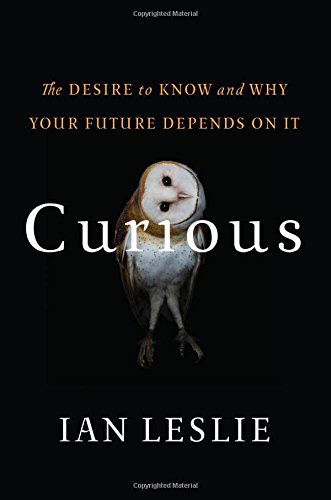

| CURIOUS The Desire to Know and Why your Future Depends on it Ian Leslie, Jr. New York: Basic Books, June 2014 |
Rating: 5.0 High |
|||
| ISBN-13 978-0-465-05694-1 | ||||
| ISBN-10 0-465-05694-2 | 216pp. | HC | $26.99 | |
| Page 15: | Mark Pagel: "...our close genetic relatives, chimps, sit in the forest as they have for millions of years cracking the same nuts and stones." |
| And some sit in human laboratories learning the rudiments of language. I don't dispute Mark Pagels' contention that apes lack the same sort of curiosity humans are blessed with. What I do dispute is that the gulf is as great as he avers. |
| Page 21: | "...the sheep's mother would be complaining about her young daughter's choice of sexual partner." |
| Yes, one of those depraved sandwich-seekers. |
| Page 29: | "We're so used to the idea of being able to ask questions that we've forgotten what an amazing skill, or set of skills, it is. First, you have to know that you don't know—to conceive of your own ignorance." |
| And then you can know The Colors of the Wind. |
| Page 115: | "A fact is a particular class of idea about the world, and it can be put to work in a lot of different ways." |
| Maybe it's me, but this doesn't seem to make sense. |
| Page 124: | "In other words, the knowledge rich tend to get richer, while the knowledge poor get poorer." |
| Missing hyphens: S/B "knowledge-rich" and "knowledge-poor". |
| Page 130: | "A chess master like James can see what is and isn't possible within a glance." |
| Spelling: S/B "with a glance". |
| Page 141: | "In his book Why the West Rules—for Now, Ian Morris argues that China's decline relative to the West has a lot to do with a simple geographical fact: the widths of the Atlantic and Pacific oceans." |
| The idea here is that the Atlantic was big enough to foster separate cultures around its shores, but not too big to prevent them crossing it and meeting to exchange ideas — while the vastness of the Pacific precluded such passages. But the Polynesians in their outrigger canoes crossed the Pacific to settle most of its islands. And in the Ming dynasty Admiral Zheng He voyaged widely. He did not cross the Pacific, but his successors most likely would have if China's rulers had not turned inward. |
| Page 166: | "A PORTMANTEAU OF 'THINK' AND 'TINKER', THE ORIGIN OF THE verb 'to thinker' is unknown." |
| Dangling participle: S/B " 'to thinker' is a verb whose origin is unknown". (The caps are in original. I think this is the only place in the book where the first line of a section is put in all caps.) |

 To contact Chris Winter, send email to this address.
To contact Chris Winter, send email to this address.